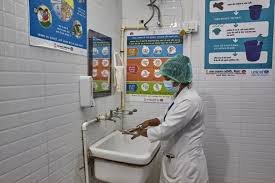
ABUJA, Nigeria – A recent report jointly published by the World Health Organisation (WHO) and UNICEF has revealed that billions of people worldwide are still treated in health facilities lacking basic services such as water, sanitation, hygiene, waste management, and electricity.
The report, released on Wednesday and titled Essential Services for Quality Care, highlights progress in setting standards and assessments but warns that urgent investment is required to meet 2030 targets.
“Every patient deserves care in a facility that is safe, hygienic, and properly equipped. Without reliable water, sanitation, hygiene, and electricity, health workers cannot prevent infections or provide essential services,” said Dr. Ruediger Krech, WHO Director a.i, Environment, Climate Change and Health.
According to the organisations, the findings will be launched formally on 24 September at a UN high-level meeting in New York, co-chaired by Hungary and the Philippines. The gathering builds on the 2023 UNGA Resolution on universal access to WASH and energy in health care facilities.
Governments, UN agencies, and partners are expected to use the meeting to accelerate progress, close financing gaps, and ensure every facility worldwide provides safe, quality, and dignified care.




